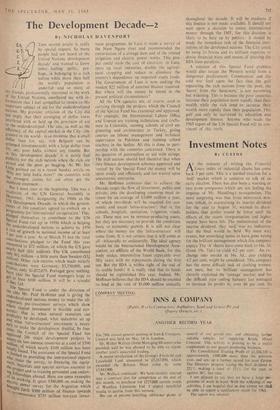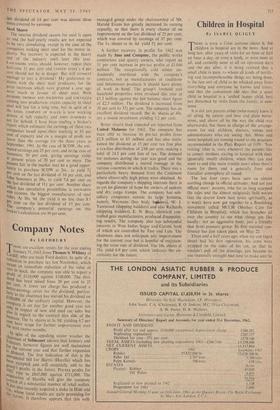Investment Notes
By CUSTOS
A- the moment of writing the Financial Times index of industrial shares has come hack 3 per cent. This is a normal reaction for a 'bull' market which is sensitive to talk of an early election. There has also been a warning or two from companies which are not feeling the impetus of Mr. Maudling's re-expansion. The most surprising was that from MON1AGUE Bun- TON, which, in maintaining its interim dividend for the year to August 31, warned its share- holders that profits would be lower until the effects of the recent reorganisation and higher output have been felt. The maintenance of the interim dividend, they said, was no indication that the final would be held. We must wait events, but something seems to have,gone wrong for the brilliant management which this company enjoys. The 'A' shares have come back to 16s. 3d. (from 19s. 71d.) to yield 4.2 per cent. An ex- change into ICU:1ER at 16s. 3d., also yielding 4.2 per cent, might be considered. This company has the more difficult task of clothing women. not men, . but its brilliant Management has cleverly exploited the 'teenage' market, and for the difficult year ending January last managed to increase its profits by over 40 per cent. Its
last dividend of 14 per cent was almost three times covered by earnings.
Steel Shares
The interim dividend season for steel is upon us and the half-yearly results are not expected to be very stimulating. except in the case of the companies making sheet steel for the motor in- dustry. No recovery is expected in the heavy end of the industry until later this year. LANCASHIRE Si EEL should, however, repeat their half-time 31 per cent and UNITED STEEL'S 4 per cent should not be in danger. But will CONSETT manage to pay a dividend? My preference re- mains with the sheet steel producers, for the price increases which were granted a year ago were much in favour of sheet steel. With RICHARD THOMAS AND BALDWINS and COLVILLES coming into production. excess capacity in sheet steel will last for a long time, but in spite of it the STEEL COMPANY OF WALES is now working almost at full capacity and JOHN SUMMERS is not far behind. I have been reading a broker's report which estimates the earnings of these two companies based upon their working at 85 per cent of capacity and on a margin of profit not lower than the average for the three years to September, 1961. In the case of SCOW, the esti- mated earnings are 25 per cent, and in the case of Summers, 30 per cent, giving earnings yields at present prices of 20 per cent or more, The Present fall in the market may be a good oppor- tunity to purchase SCOW at 26s., to yield 71 per cent on the last dividend of 10 per cent, and John Summers at 30s., to yield 7.6 per cent on the last dividend of 114 per cent. Another share which has speculative possibilities is STEWARTS AND LLOYDS, the biggest manufacturer of steel tubes. At 36s. 9d. the yield is no less than 8,1 Fir cent on the last dividend of 15 per cent. ,the company's potential earnings on this broker's calculation are 30 per cent.



































 Previous page
Previous page